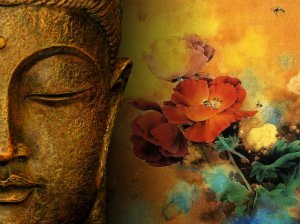Namaste: the Value of Gratitude and Recognition

Namasté is much more than just a word originating from the beautiful, ancestral Sanskrit language. It contains a number of concepts that have become universal and, in turn, crossed borders.
It goes beyond a greeting and customary farewell used in the practice of yoga; the term contains, in its ancient roots, an essence that should be pumped through the heart of humanity every day. However, it seems that in our consumer society addicted to fashion and fads, we have lost the true meaning and intrinsic value of the word.
Is a sense of gratitude practiced today with noble humility? Do we recognize others just as we recognize ourselves? This is what really lies deep in the meaning of the word “Namasté,” so today we would like to talk about it and about the values that we do not see as easily in our day to day.
Namasté, I bow to you and recognize you
In Western society, the word “Namasté” is closely associated to yoga. However, those who have knowledge of the ever interesting culture and religion of Southern Asia will know that this term is used with frequency in the daily lives of Hindus, Buddhists, and all of the people who have assimilated it into their ritual of greetings and farewells – this word, full of symbolism, that also encloses a universal sense of giving thanks.
In fact, it is worth pointing out that it is not a single word, but a combination of two separate terms: “namas,” which could be translated as “greeting” or “reverence,” and whose root is “nam,” meaning “bowing” or “leaning;” and “te,” which would become a personal pronoun to create the expression “I bow to you.”
This idea in turn characterizes the concept of spirituality that represents the culture: that we all are actually one with the universe.
So what does this imply?
Oneness
If all of us are part of the same entity, what affects you also affects me. Therefore, I recognize others as part of myself; hence I give my respect and the word Namasté is represented with the gesture of joining the hands.
In doing so, we communicate to the other person that we are equals, we are the same. It is additionally interesting to consider that for Hinduism, the right hand represents deity (the spiritual plane), while the left hand represents the earthbound worshiper that bows to the said deity.
Gratitude
By saying the word Namasté we give thanks to the other person and we recognize them for what they have done. However, in thanking another you also recognize yourself, because both of you have had a part in creating a mutual connection.
That is, if I for example help a friend work out a problem and they thank me, we both come out of the situation having benefitted: they have resolved a problem and I have done a noble act. We, together, form a whole where we recognize one another equally.

Namasté, a value to integrate into our daily lives
You may not be religious. You may not even see yourself as a spiritual person capable of using the word Namasté from now on. But this is not what we are looking for at all. We just want you to think about the values that are involved in the word: gratitude and recognition.
How can we integrate those values into our daily lives?
- To implement your sense of gratitude, you first must learn to be humble, but beware – humility does not mean you give everything to others and keep nothing for yourself. Being humble means knowing how to judge our own limits, to admit our faults, and to learn to enjoy and appreciate the simple things while always having an open mind and recognizing that we can learn from and receive help from others with what they have to offer us. He who is humble is grateful, because he understands as well as anyone the real value of things.
- Respect those around you, respect Nature, and also remember to respect yourself.
- Appreciate your friends and family, listen and learn from every experience. Honor everyone and yourself like you deserve, like part of that “everything.”
- Be happy for everything you do and for everything you receive from others and your surroundings, no matter how small it may be.
- Be thankful, remember to always be thankful for all that you see, all that you feel, all that you receive… Because everything forms a part of you as well as that wholeness where you can find your true balance.
Namasté is much more than just a word originating from the beautiful, ancestral Sanskrit language. It contains a number of concepts that have become universal and, in turn, crossed borders.
It goes beyond a greeting and customary farewell used in the practice of yoga; the term contains, in its ancient roots, an essence that should be pumped through the heart of humanity every day. However, it seems that in our consumer society addicted to fashion and fads, we have lost the true meaning and intrinsic value of the word.
Is a sense of gratitude practiced today with noble humility? Do we recognize others just as we recognize ourselves? This is what really lies deep in the meaning of the word “Namasté,” so today we would like to talk about it and about the values that we do not see as easily in our day to day.
Namasté, I bow to you and recognize you
In Western society, the word “Namasté” is closely associated to yoga. However, those who have knowledge of the ever interesting culture and religion of Southern Asia will know that this term is used with frequency in the daily lives of Hindus, Buddhists, and all of the people who have assimilated it into their ritual of greetings and farewells – this word, full of symbolism, that also encloses a universal sense of giving thanks.
In fact, it is worth pointing out that it is not a single word, but a combination of two separate terms: “namas,” which could be translated as “greeting” or “reverence,” and whose root is “nam,” meaning “bowing” or “leaning;” and “te,” which would become a personal pronoun to create the expression “I bow to you.”
This idea in turn characterizes the concept of spirituality that represents the culture: that we all are actually one with the universe.
So what does this imply?
Oneness
If all of us are part of the same entity, what affects you also affects me. Therefore, I recognize others as part of myself; hence I give my respect and the word Namasté is represented with the gesture of joining the hands.
In doing so, we communicate to the other person that we are equals, we are the same. It is additionally interesting to consider that for Hinduism, the right hand represents deity (the spiritual plane), while the left hand represents the earthbound worshiper that bows to the said deity.
Gratitude
By saying the word Namasté we give thanks to the other person and we recognize them for what they have done. However, in thanking another you also recognize yourself, because both of you have had a part in creating a mutual connection.
That is, if I for example help a friend work out a problem and they thank me, we both come out of the situation having benefitted: they have resolved a problem and I have done a noble act. We, together, form a whole where we recognize one another equally.

Namasté, a value to integrate into our daily lives
You may not be religious. You may not even see yourself as a spiritual person capable of using the word Namasté from now on. But this is not what we are looking for at all. We just want you to think about the values that are involved in the word: gratitude and recognition.
How can we integrate those values into our daily lives?
- To implement your sense of gratitude, you first must learn to be humble, but beware – humility does not mean you give everything to others and keep nothing for yourself. Being humble means knowing how to judge our own limits, to admit our faults, and to learn to enjoy and appreciate the simple things while always having an open mind and recognizing that we can learn from and receive help from others with what they have to offer us. He who is humble is grateful, because he understands as well as anyone the real value of things.
- Respect those around you, respect Nature, and also remember to respect yourself.
- Appreciate your friends and family, listen and learn from every experience. Honor everyone and yourself like you deserve, like part of that “everything.”
- Be happy for everything you do and for everything you receive from others and your surroundings, no matter how small it may be.
- Be thankful, remember to always be thankful for all that you see, all that you feel, all that you receive… Because everything forms a part of you as well as that wholeness where you can find your true balance.
This text is provided for informational purposes only and does not replace consultation with a professional. If in doubt, consult your specialist.







